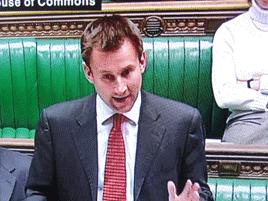Digital Britain report slammed by Tories
"Instead of a solution we have a new tax on internet users"

Responding to today's Digital Britain interim report from Lord Carter, the Conservative Party has rubbished the report on a number of levels, noting that the UK still lags behind on broadband speeds, broadband access, digital adoption skills and next-generation training.
The Shadow Culture Secretary James Hunt 'welcomed' the interest the government has shown in the UK's digital economy, but added that "sadly most people will be pretty disappointed with this report."
"The digital economy is vital for Britain because of our natural strengths in creating digital content. But when it comes to delivery of that content, we are lagging badly."
Hunt pointed out the following areas that the UK was falling behind in:
- 21/30 for broadband speed
- 40 per cent of households without broadband at all, with connections falling last year
- Moved from 7th to 12th in EU global league table of digital adoption skills and use
- Next generation training: report itself concedes France, Germany, US and Japan are ahead of the UK
Action not reports
The Conservatives want to see action, not more reports, pointing out that 'Action 1' on Lord Carter's report is: "to establish a government-led strategy group."
The Conservatives pledge to "ensure that more than half the population has access to next generation networks within five years" and that, if necessary, it would force BT to make necessary improvements to ducts to improve the UK's broadband infrastructure.
Sign up for breaking news, reviews, opinion, top tech deals, and more.
Neither of these key actions have been properly dealt with within Lord Carter's report, claim the Tories.
The Tories are also unclear as to who will pay for universal broadband. "Expressing a sentiment is fine, but without a roadmap to delivery it is surely a totally empty promise," said Hunt.
He added, "Isn't the scale of the government's ambitions pitifully low, simply saying it wants to ensure the whole population has access to half the current average speed by 2012?"
Who's in charge here?
There is also confusion over who is in charge of "delivering on such huge commitments" – is it Lord Carter, Lord Mandelson or the Secretary of State?
"Can we have a categorical assurance there is no turf war going on between DCMS, DBERR and Ofcom that [will] prevent the government showing the leadership that's so desperately needed?"
Regarding DAB, the Conservatives said: "we are making a clear statement that DAB should be a primary distribution network. So how will it be funded? How will the government make sure DAB becomes available in people's cars? How will it ensure signal is strengthened in rural areas?"
Copyright, piracy, safe internet
On copyright protection, Hunt remarks: "instead of a solution, we have a proposal to set up a new quango and a new tax on internet users. Why do we need another agency when Ofcom is already equipped and able to do that job? And why should legitimate internet users have to pay for [the] copyright infringement of transgressors?"
On peer-to-peer file sharing: "they talk about consulting about legislation? But can the Secretary of State tell me how ISPs are supposed to identify illegally shared files, given what happened in France when many users simply reacted by encrypting their files when the French government introduced similar measures?"
On internet content: "the Secretary of State's idea for cinema-style rating for websites is not in there? So, can he tell us if it has been sidelined, perhaps by voices in government more realistic about the ability of government to control the internet?
